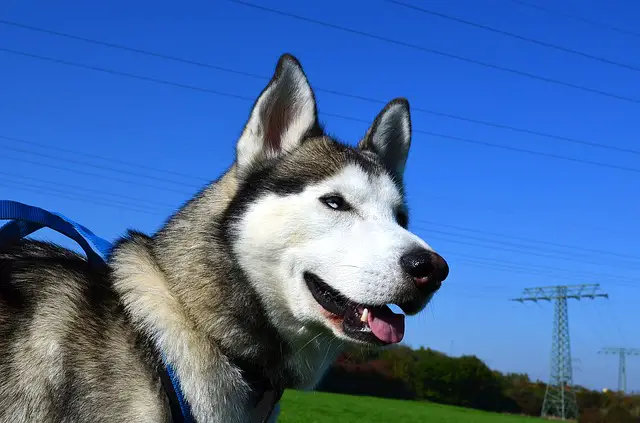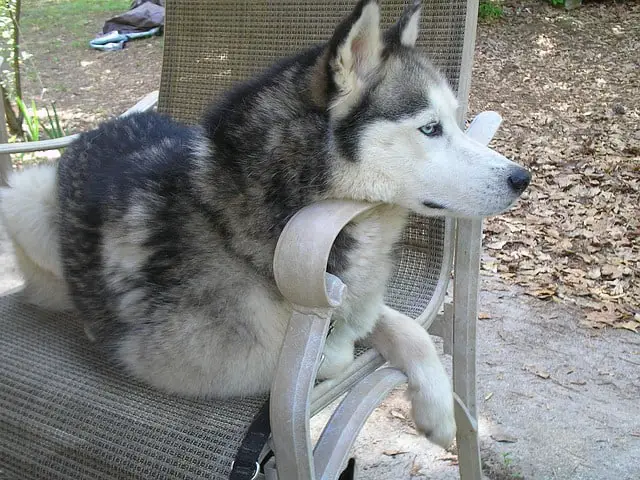Sneezing, sniffling, itchy watery eyes, hives and all of those symptoms sound like allergies to me.
If you suffer from allergies, you know how annoying it can be and those feelings are not only uncomfortable for you, they can irritate others with all of the sounds.
If you come down with allergies every spring, then seeing those commercials with someone sneezing in rapid-fire succession is no joke! Not a bit of fun for anyone.
Can dogs suffer from allergies?
They certainly can be allergic to many different allergens, but it may be a little harder to diagnose because the way they react when allergies strike will present in a different way than your reaction.
Do Siberian huskies get allergies or are they hypoallergenic and unaffected by pollens? Huskies can, in fact, develop allergies.
In the following reading, I will familiarize you with some common husky allergies and how to deal with allergies and huskies.

For your dog’s vitamin supplement, food, toys, or other dogs product please visit the Sundays for Dogs website.
Siberian Husky Appearance
The Siberian husky is quite the striking breed with its solid, medium-sized build. Being strong and sturdy, they are by no means clumsy.
Quite the opposite is true. They are naturally limber and light on their feet when in motion.
The husky’s fur is medium length but with a double-thick coat, the undercoat providing extra added insulation. A healthy husky has a dense luxurious coat in colors from pure white to black. Some huskies have unusual pattern markings on their head, not seen on other breeds.
Unfortunately, your Siberian husky’s rich thick coat can be affected if your pup suffers from allergies.
They can lose fur by constant itchy skin which causes them to scratch continuously creating bald patches.
To check your Huskies’ health status or their DNA checks, please visit the Embark vet website for all the help you may need.

Common Siberian Husky Allergies and Symptoms
Siberian huskies, although generally healthy, are prone to a range of skin issues. Many of these allergies and problems do not escalate into something major if addressed quickly, although identifying the cause can sometimes be a bit tricky.
Unfortunately, humans may outgrow allergies while a dog may get worse. Below are some causes of allergies and symptoms.
Food allergies
Your Siberian husky may have a problem with their food wherein it affects them in an allergic way. It may be a new food or it may be one they’ve eaten for years. Developing an allergy and most often a food allergy can occur at any time in a dog’s life and this is true in humans as well.
Ingredients in your husky’s food that are common for this are usually sources of protein like chicken, beef, eggs, and milk while others can be fillers like grains and unnecessary additives.
Symptoms of food allergies can be itchy skin with scratching, constant rubbing of the face and licking and chewing of the paws or legs.
Fur loss can occur in many places. Along with skin issues, food allergies can cause gastrointestinal problems such as vomiting and diarrhea.
Environmental and seasonal allergies
Just as we humans can be allergic to pollen outdoors and dust from dust mites indoors, so can our dogs.
In your husky, symptoms would not be like sneezing, runny nose, and itchy watery eyes. Their symptoms would be skin-related, just as food allergies usually are.
Usually, there are no GI symptoms related to environmental and seasonal allergies and these are sometimes referred to as atopy.
These allergies can be caused by mold spores, dust mites, and pollen from plants and grasses. Symptoms are similar to food allergies with itchy skin and scratching face rubbing and licking, and chewing paws.
Your pup may develop ear or skin infections. The skin may be red and inflamed on your pup’s stomach, face, ears, legs, and paws.
Your husky may also suffer from “hot spots,” which are lesions from scratching, licking, biting, and chewing.
These hot spots can be large or small, will be raw-looking, moist, and often bleed. These can lead to hair loss.
Flea Allergies
Fleas can be a problem for your husky and your whole household especially if it turns into a full-blown infestation, which can be prevented.
Your husky can suffer from flea allergy dermatitis. Fleas feed on the blood of your pup and while feeding they inject saliva, which contains amino acids, enzymes, and peptides but also compounds containing histamine that can cause an immune response in your pup.
If they are sensitive to it, allergy symptoms will begin. These symptoms can develop from twenty-four to forty-eight hours or in as little as fifteen minutes.
Even if you don’t see fleas, the cause of your husky’s discomfort still can be caused by very tiny fleas. Anyone can bring fleas indoors, not just your pup, and not just in warm weather either.
Check your husky’s stomach and at the base of its tail if you suspect fleas.
Zinc deficiency
Zinc deficiency or zinc-responsive dermatosis is not an allergy, but it is genetic in nature and can cause skin problems from allergies to worsen.
This zinc-responsive dermatosis comes about because Siberian huskies genetically lack an enzyme that allows them to absorb zinc, meaning that huskies poorly absorb zinc leading to a deficiency, as zinc is an essential mineral.
Zinc-responsive dermatosis can cause flaky, itchy skin, lesions, redness, and eventual hair loss. Being deficient in zinc can put a strain on your husky’s immune system, causing them to become lethargic, and run-down, down, and leaving the door wide open to allergies and infection.
Nasal solar dermatitis can also occur and is caused by zinc deficiency combined with too much exposure to the sun. Symptoms are inflammation of the nose and eyes, and ulcers on the nose that may bleed.
A few other causes and triggers of allergies are:
- Over-vaccinating
- Prescription medications
- Harsh shampoos and flea shampoos
Again, symptoms of allergies can be one or more of the following:
- Scratching caused by itchy skin
- Red, irritated skin
- Licking, Biting, Chewing skin and fur
- Hair Loss
- Gastrointestinal issues (vomiting, diarrhea)
How To Deal With Siberian Husky Allergies
Before you can treat your husky for allergies you must first know what your husky is allergic to. Consulting your veterinarian is a good first step if you are unable to identify the source. If you have an idea of what the allergy may be from, share it with them. If you and they are stumped, allergy testing can be performed to determine the cause with a blood test.

Listed below are tips for allergy prevention and relief.
- Shampoos can be used to prevent allergies by keeping skin and coat in healthy condition but can also be used to soothe and moisturize irritated skin from allergies.
- Safe flea treatments to rid your pup of fleas and prevent flea allergy dermatitis. Consult your veterinarian to make sure it’s a non-irritating shampoo or powder, perhaps all-natural.
- Pet wipes can be used to remove pollen and dirt when your husky has been outdoors. They are great if time is too short for bathing and many contain moisturizers for healthy skin and coat.
- Pet wipes can be used to remove pollen and dirt when your husky has been outdoors. They are great if time is too short for bathing and many contain moisturizers for healthy skin and coat.
- Change your husky’s food if they are suffering from a food allergy. Ask your veterinarian for their recommendation and switch food gradually so as not to upset their stomach. There are many excellent high-quality foods on the market for breeds with allergies.
- Coconut oil applied to your husky’s skin and coat is a great natural help in keeping these healthy. Coconut oil can also be added to their food and it is an anti-inflammatory as well as an antibacterial. Speak with your veterinarian first to make sure it is safe for your husky.
- Talk to your veterinarian about giving your pup probiotics for good gut health. Having a healthy gut is good for the whole body.
- Keep your house clean by vacuuming frequently to remove not only loose fur and dander but dust and dust mites. Wipe surfaces down frequently and be on the lookout for signs of fleas or ticks.
- If needed, allergy medication is available for your husky. Sometimes steroids are used, such as cortisone for short-term use or if allergies are seasonal. Steroid lotions are often used to ease the itch and inflammation of hot spots.
- Your husky’s food should contain fatty acids such as fish oil which helps skin and coat as well as eases inflammation. If their food does not contain fatty acids ask your veterinarian about a fish oil supplement.
- Speak with your veterinarian about checking your Siberian husky’s zinc levels and see if a zinc supplement is necessary. Don’t just give them supplements on your own. There are different dosages and some supplements cause health issues if dosages are too high.
Siberian Huskies can suffer from allergies just as we humans do. If your pup is suffering from any of the symptoms listed above, speak with their veterinarian. As you see, there are many options to help your husky live a healthy and comfortable life with allergies.